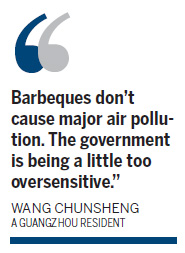Latest News
Asiad effect: Barbeque stalls banned
By Zheng Caixiong (China Daily)
Updated: 2010-10-26 07:57
 |
Large Medium Small |

GUANGZHOU - In a major step to ensure good air quality during the upcoming Asian Games in Guangzhou, Guangdong provincial authorities have decided to ban street barbeque stalls in 11 cities between Nov 1 and Dec 20.
The provincial environment protection department has also prohibited commercial enterprises in Guangzhou, the host city of the 16th Asian Games and Asian Para Games, from refurbishing or painting their interiors between the dates in a bid to avoid air pollution.
The two-week 2010 Asian Games opens on Nov 12, while the first-ever Asian Para Games, a parallel sport event for disabled athletes, will run in the city from Dec 12 to Dec 19.
Guangdong's environment protection department has ordered some 15 polluting enterprises in Guangzhou and nearby cities such as Foshan, Zhongshan, Qingyuan, Jiangmen, Dongguan and Zhaoqing to either completely halt or reduce production by at least 50 percent starting Nov 1.
Moreover, the province will remove high-emission vehicles from the streets for the 50-day period.
The department said it was banning street barbecue stalls because they use a high-polluting fuel, while interior decoration and paint jobs "release volatile organic compounds".
Residents feel the government is going a little overboard in its attempt to clean Guangzhou's air before the sporting extravaganza.
Wang Chunsheng, 28, a Guangzhou resident, felt barbeque stalls should not be banned even while the Asian Games are in progress.
"Barbeques don't cause major air pollution," he said, adding, "The government is being a little too oversensitive."
"Many Guangzhou residents like snacking at barbecue stalls in the winter," he said.
Chen Wenxia, a local white-collar worker, however, differed, saying it is "understandable" Guangdong wants to leave no stone unturned to ensure good air quality during the games, especially after seeing how critical the international media was of Beijing's air prior to the 2008 Olympic Games.
Chen Guangrong, deputy director of the provincial environmental protection department, defended the bans, saying authorities will do all they can to ensure Guangzhou's air quality meets State requirements during the games period.
"The Guangdong provincial government has established a special task force, mainly consisting of environmental protection experts, to help cope with any emergent cases and offer technical assistance in improving air quality," Chen said at a press conference in Guangzhou on Monday.
If necessary, the government will take more emergency measures, he added.
Guangzhou will further ban vehicles with even and odd-numbered license plates on alternate days during the games period to reduce pollution. And more than 30 percent of the local government's vehicles will be prohibited from operating on the city's streets during the games.
Guangdong has been making efforts to fight air pollution for the past eight years, and the efforts are slowly bearing fruit, Chen said.
To date, more than 30 chemical plants and many small and medium-sized coal-burning thermal power stations have been relocated or shut down, he said.
"The air quality in the Pearl River Delta has seen a marked improvement in the first nine months of the year compared with the same period last year," Chen added.
Guangzhou Mayor Wan Qingliang said his city has completed 5,873 projects to improve the city's air and water quality since 2004.
Statistics from Guangzhou's environmental protection department show that the city witnessed good air quality on 97.07 percent of the days in the first nine months of this year.
China Daily
(China Daily 10/26/2010 page3)